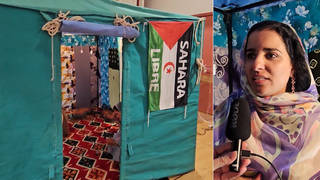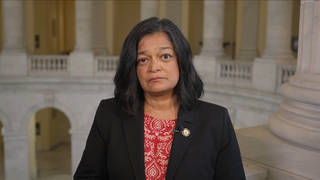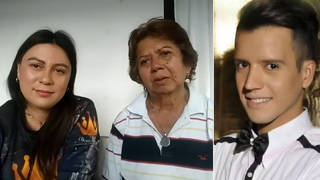This content originally appeared on Democracy Now! and was authored by Democracy Now!.
This post was originally published on Radio Free.
This content originally appeared on Democracy Now! and was authored by Democracy Now!.
This post was originally published on Radio Free.
This content originally appeared on Democracy Now! and was authored by Democracy Now!.
This post was originally published on Radio Free.
This content originally appeared on Democracy Now! and was authored by Democracy Now!.
This post was originally published on Radio Free.
This content originally appeared on Democracy Now! and was authored by Democracy Now!.
This post was originally published on Radio Free.
This content originally appeared on Democracy Now! and was authored by Democracy Now!.
This post was originally published on Radio Free.
This content originally appeared on Democracy Now! and was authored by Democracy Now!.
This post was originally published on Radio Free.
This content originally appeared on Democracy Now! and was authored by Democracy Now!.
This post was originally published on Radio Free.

We go to the U.N. Human Rights Council in Geneva, where activists are shining a light on Morocco’s brutal occupation of Western Sahara and its Indigenous people, the Sahrawi. The Sahrawi journalist and activist Asria Mohamed speaks with Democracy Now!’s Amy Goodman about “Jaimitna,” an art installation that evokes the tents of Sahrawi people living in refugee camps. The installation features various melhfas, traditional clothing worn by Sahrawi women, and includes their stories. “These women, they spent years and years in prison. They have been tortured. They have been beaten up. They have been raped,” Mohamed says. We also speak with María Carrión, executive director of FiSahara, the Sahara International Film Festival, who says the story of the Sahrawi must be better known. Morocco has occupied Western Sahara since 1975 in defiance of the United Nations and the international community. The first Trump administration recognized Moroccan sovereignty in 2020 as part of a larger effort to normalize relations between Israel and its Arab neighbors.
This content originally appeared on Democracy Now! and was authored by Democracy Now!.
This post was originally published on Radio Free.

The Supreme Court’s term ended Friday with a decision that promises to further expand the power of the president. Conservative justices argued lower federal courts cannot issue nationwide injunctions — a decision that limits judicial checks on presidential power. “We have an imperial court that has created an imperial presidency,” says Dahlia Lithwick, writer and host of the legal podcast Amicus. The 6-3 decision, split along ideological lines, could dramatically reshape legal citizenship in the United States and clears the path for many other Trump orders to potentially go into effect. The court also ruled on a case that will allow parents to pull their children from classes including LGBTQ+ books. The conservative justices “cast these books as coercive simply because they have LGBT characters,” says Chase Strangio, lawyer and co-director of the American Civil Liberties Union’s LGBTQ & HIV Project.
This content originally appeared on Democracy Now! and was authored by Democracy Now!.
This post was originally published on Radio Free.

Senate lawmakers are debating President Trump’s 940-page so-called big, beautiful bill as Republicans race to meet a Trump-imposed July 4 deadline and are set to vote on key amendments. Senate Republicans have deepened the cuts to Medicaid while cutting taxes for the wealthy and increasing the national deficit. “Basically, you have Republicans taking food and medicine and other things away from vulnerable people in order to finance tax cuts for the rich,” says David Dayen, executive editor of The American Prospect.
Dr. Adam Gaffney, a critical care physician and professor at Harvard Medical School, co-authored a report that found the bill could lead to 1.3 million Americans going without medications, 1.2 million Americans being saddled with medical debt, 380,000 women going without mammograms, and over 16,500 deaths annually. “I work in the ICU. I see patients with life-threatening complications of untreated illness because they didn’t get care because they couldn’t afford it. What happens when we add to that number massively?” says Gaffney.
This content originally appeared on Democracy Now! and was authored by Democracy Now!.
This post was originally published on Radio Free.
Democracy Now! Monday, June 30, 2025
This content originally appeared on Democracy Now! Audio and was authored by Democracy Now!.
This post was originally published on Radio Free.
This content originally appeared on Democracy Now! and was authored by Democracy Now!.
This post was originally published on Radio Free.
This content originally appeared on Democracy Now! for Broadcasters – HD MP4 and was authored by Democracy Now! for Broadcasters – HD MP4.
This post was originally published on Radio Free.
This content originally appeared on Democracy Now! and was authored by Democracy Now!.
This post was originally published on Radio Free.
This content originally appeared on Democracy Now! and was authored by Democracy Now!.
This post was originally published on Radio Free.
This content originally appeared on Democracy Now! and was authored by Democracy Now!.
This post was originally published on Radio Free.
This content originally appeared on Democracy Now! and was authored by Democracy Now!.
This post was originally published on Radio Free.
This content originally appeared on Democracy Now! and was authored by Democracy Now!.
This post was originally published on Radio Free.

Democrat Pramila Jayapal is holding a series of “shadow hearings” in Congress on Trump’s immigration actions. Jayapal, the ranking member of the Subcommittee on Immigration, Integrity, Security and Enforcement, explains how Trump’s immigration crackdown has created a “Catch-22” for asylum seekers, who are being targeted for “expedited removal” at their own immigration hearings. “If you show up, you could get detained and deported. … If you don’t show up, then you are now in violation of the immigration regulations, and you’re deemed as an absconder.” Jayapal also comments on Trump’s “big, beautiful budget bill,” which she calls the “big, bad, betrayal bill” for its cuts to Medicaid and other social services.
This content originally appeared on Democracy Now! and was authored by Democracy Now!.
This post was originally published on Radio Free.

Over 100 days have passed since the Trump administration’s unprecedented removal of more than 230 immigrants to El Salvador’s notorious mega-prison CECOT. They were removed without any due process in the United States. Democracy Now! spoke with the loved ones of Andry Hernández Romero, a 33-year-old gay makeup artist and asylum seeker who was told he would be sent home to Venezuela, according to his mother. But instead, he was sent to CECOT, where reports of torture and abuse are rampant. His mother Alexis Romero and his best friend Reina Cardenas have not seen or heard from him in three months. He has been identified in photos taken at CECOT by a photojournalist. Hernández Romero “was detained from the moment he showed up for his asylum appointment,” says Cardenas. “He never had due process.” Adds Margaret Cargioli, a lawyer for the family, “He sought asylum because he was persecuted due to his political opinion and because he’s LGBTQ. … It is quite astonishing that in the United States, people are being disappeared in this manner.”
This content originally appeared on Democracy Now! and was authored by Democracy Now!.
This post was originally published on Radio Free.

The Supreme Court has sided with South Carolina’s efforts to defund Planned Parenthood. Lower court rulings allowed Medicaid patients to sue over the state’s restrictions on Medicaid funding for their healthcare clinics, which the Supreme Court overturned in a 6-3 decision on Thursday. Rebecca Grant, who writes about reproductive rights, says South Carolina’s restrictions will likely be taken up by other states and could result in the closure of potentially hundreds of reproductive healthcare clinics. Grant outlines the alternative healthcare methods that many are forced to turn to in the face of dangerous and — since the fall of Roe v. Wade — increasingly draconian abortion restrictions. “We know throughout history that making abortion illegal or trying to ban it does not make it go away,” she says. This underground network of abortion access in the United States is the subject of Grant’s new book, Access: Inside the Abortion Underground and the Sixty-Year Battle for Reproductive Freedom.
This content originally appeared on Democracy Now! and was authored by Democracy Now!.
This post was originally published on Radio Free.
Democracy Now! Friday, June 27, 2025
This content originally appeared on Democracy Now! Audio and was authored by Democracy Now!.
This post was originally published on Radio Free.
This content originally appeared on Democracy Now! Audio and was authored by Democracy Now!.
This post was originally published on Radio Free.
This content originally appeared on Democracy Now! and was authored by Democracy Now!.
This post was originally published on Radio Free.
This content originally appeared on Democracy Now! Audio and was authored by Democracy Now!.
This post was originally published on Radio Free.
This content originally appeared on Democracy Now! for Broadcasters – HD MP4 and was authored by Democracy Now! for Broadcasters – HD MP4.
This post was originally published on Radio Free.
This content originally appeared on Democracy Now! and was authored by Democracy Now!.
This post was originally published on Radio Free.
This content originally appeared on Democracy Now! and was authored by Democracy Now!.
This post was originally published on Radio Free.